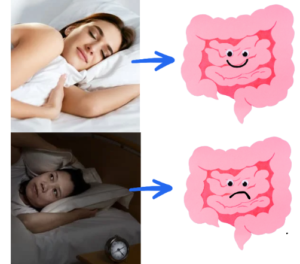Understanding the Critical Relationship Between Quality Sleep and Digestive Health
Sleep serves as more than just a restorative period; it plays a crucial role in regulating our digestion. The intricate connection between sleep and digestive health encompasses various physiological processes that work together seamlessly. Central to this relationship is the body's circadian rhythm, often referred to as the internal clock, which synchronizes our sleep cycles with our digestive functions. This alignment accounts for why individuals often experience hunger at similar times each day, demonstrating our body’s remarkable ability to conform to its natural biological cycles.
The Importance of Quality Sleep for Enhancing Digestive Function 
Sleep is essential for the body’s ability to heal, rejuvenate, and restore itself effectively. The deeper stages of sleep are particularly critical for these restorative functions. During these profound phases, the organs, tissues, and cells that form the digestive system not only relax but also engage in vital repair processes. The body prioritizes cellular repair and growth during deep sleep, especially the regeneration of cells lining the digestive tract. These cells endure constant wear and tear from exposure to food particles and digestive enzymes. This regenerative process is fundamental for maintaining the integrity of the gastrointestinal lining, which in turn enhances the efficiency of digestion.
Deep sleep also plays a significant role in strengthening the immune system, which is particularly crucial for the digestive system. This system is home to its specialized immune cells, which are activated by beneficial gut bacteria. These immune cells are essential for defending the gut and the entire digestive system against harmful microorganisms, thereby ensuring a balanced microbiota within the gut environment. This balance is vital for overall digestive health, as it fosters a harmonious ecosystem that supports various bodily functions.
Furthermore, the organs within the digestive system are integral to detoxification, aiding in the removal of waste and harmful substances from the body. Deep sleep enhances this detoxification process by optimizing the efficiency of the liver and kidneys, thereby allowing these organs to operate at peak performance. This cooperative relationship between sleep and detoxification is vital for achieving overall digestive health and well-being.
Understanding the Relationship Between Gut Motility and Sleep Cycles
An essential aspect of digestion is the effective transport of food and waste through the digestive tract, a process known as gut motility. This process undergoes significant changes during sleep. During both deep and light phases of sleep, the rate of gut motility significantly diminishes. This reduction is a necessary adjustment that allows the digestive system to conserve energy, which is redirected towards repairing digestive tissues. This energy conservation facilitates more effective digestive processes during waking hours, optimizing both nutrient absorption and waste elimination.
The migrating motor complex plays a crucial role in gut motility, representing a cycle of contractions that occurs during fasting periods, including during sleep. This cycle is vital for gut motility, as it efficiently sweeps away food particles and residual waste that may linger in the digestive system. This natural cleansing mechanism minimizes the risks of bacterial overgrowth, thus promoting a healthy gut environment. Notably, the migrating motor complex is most active at night when individuals are fasting and sleeping, underlining the indispensable role of sleep in ensuring the health of the digestive system.
As dawn approaches, gut motility gradually increases, preparing the digestive system to efficiently process and digest food. This rise in motility can also trigger the first bowel movement of the day, illustrating the finely tuned relationship between sleep and gut motility. Understanding this connection is essential for optimizing digestive health and enhancing overall well-being.
Investigating Hormonal Impact on Sleep Quality and Digestive Function
Ghrelin, often known as the hunger hormone, serves as a significant player in stimulating appetite. In contrast, leptin communicates to the brain that the stomach is full, helping to prevent overeating. Together, these hormones are crucial for appetite regulation, but their functions can be negatively impacted by insufficient sleep.
Just one night of poor sleep can lead to elevated levels of ghrelin, which may increase appetite and lead to cravings, especially for carbohydrates. This phenomenon is commonly described as feeling ‘hangry’. Compounding this issue, levels of leptin can fall after a night of inadequate sleep, disrupting the signals that indicate satiety. This creates a challenging scenario where individuals may overeat and make unhealthy food choices while struggling to interpret their body's cues to stop eating. While occasional poor sleep may not have severe consequences, chronic insomnia can lead to significant digestive issues, including gut inflammation, liver disorders, gastroesophageal reflux disease, inflammatory bowel disease, and even colorectal cancer, along with contributing to weight gain.
Understanding the Impact of Sleep Disruption on Digestive Wellness
Disruptions to sleep can lead to a variety of digestive issues. Factors such as shift work, particularly night shifts, and the experience of jet lag can significantly disrupt sleep patterns and disturb the body’s internal clock. Additionally, late-night eating or inconsistent meal timings can adversely affect the quality of sleep. The circadian rhythm that governs sleep is closely tied to natural sunlight, which is crucial for maintaining a healthy sleep-wake cycle.
Regrettably, in our technology-driven world, many individuals find themselves indoors for most of the day, leading to decreased exposure to natural light. This change has resulted in increased exposure to blue light emitted by devices such as laptops, televisions, and smartphones, which further disrupts the sleep cycle and impacts sleep patterns, especially when this exposure occurs shortly before bedtime.
The cumulative effects of these factors can lead to serious digestive issues, including diarrhea, ulcers, inflammatory bowel disease, and disruptions in the delicate balance between beneficial and pathogenic bacteria in the gut. This imbalance can also damage the gut lining, further complicating the situation relating to digestive health.
Enhancing Microbiome Health Through Quality Sleep Practices
The microbiome consists of trillions of microorganisms residing in the gut, primarily composed of beneficial bacteria known as probiotics, along with viruses, fungi, and potentially harmful bacteria. These microorganisms are essential not just for overall health but also for digestive health. They enhance immune response and assist in digestion, facilitating the production of certain vitamins, enzymes, hormones, and amino acids. Recent investigations have unveiled a significant connection between the microbiome and sleep, indicating that disrupted sleep or chronic insomnia can negatively affect the balance of these microbes, ultimately impacting digestive health and overall wellness.
Diving Deeper into the Intricate Relationship Between Microbiome Health and Sleep Quality
The dynamic between sleep and microbiome health is complex and multifaceted. Insufficient sleep can adversely impact microbiome health, while an imbalanced microbiome can also detrimentally affect sleep quality. To understand this intricate interplay, one study highlighted a correlation between a higher abundance of specific bacterial species in the gut and faster sleep onset, alongside fewer nighttime awakenings. Although this overview cannot encompass all the findings, the main takeaway is that nurturing a diverse and abundant population of beneficial bacteria in the gut is essential for achieving optimal sleep, effective digestion, and maintaining overall health.
Analyzing the Connections Between Stress, Sleep, and Digestive Health
A frequent outcome of stress and anxiety is disturbed sleep. Conversely, these mental health challenges can also negatively affect the physical health and functionality of the digestive system. This disruption can result in altered gut motility and contribute to various issues, such as indigestion, ulcers, and irritable bowel syndrome. A significant factor in this dynamic is the impact of the so-called stress hormone, cortisol.
The Effects of Cortisol on Digestive Processes and Health
When cortisol levels rise, the body enters a fight-or-flight state, resulting in blood flow being redirected to essential areas such as the heart, brain, lungs, and muscles, while being diverted away from the digestive system. This physiological response prepares the individual to confront danger or flee, a reaction that was vital for survival in prehistoric times.
In modern times, however, stressors are often less life-threatening, such as financial concerns, workplace pressures, or insufficient sleep. While the short-term redirection of blood flow may be beneficial in acute situations, chronic stress can have detrimental effects on the digestive system, particularly concerning gut motility. Symptoms may include constipation, diarrhea, indigestion, gas, and bloating. Therefore, it is crucial to implement effective stress management strategies to support both gut health and achieve quality sleep.
Ensuring adequate sleep is paramount for maintaining a healthy digestive system, as the connection between sleep and digestion is deeply intertwined. Prioritizing effective sleep hygiene practices is essential for achieving restorative sleep. This includes minimizing exposure to blue light from electronic devices, maintaining a regular sleep schedule, creating a cool and dark sleep environment, avoiding food intake within two hours of bedtime, and ensuring exposure to natural light during the day, especially in the morning.
References
Understanding Digestive Health and Circadian Rhythms
Exploring Sleep Dysfunction and Digestive Conditions
Examining the Link Between the Gut Microbiome and Sleep
Investigating Stress and Its Effects on the Digestive System
The Article: How Sleep Affects Your Digestive System appeared first on https://janestevensnutrition.com
The Article: Sleep’s Impact on Your Digestive System Explained appeared first on https://janestevens.net
The Article Sleep’s Impact on Digestive Health Explained Was Found On https://limitsofstrategy.com

